Kia Stonic VS Hyundai Bayon
In the competitive subcompact SUV market, the Hyundai Bayon and Kia Stonic each offer unique appeal with their distinctive designs and performance characteristics. While the Bayon impresses with its spacious interior and advanced tech features, the Stonic stands out for its sporty handling and customizable aesthetics. Ultimately, both models cater to a younger audience seeking practicality without sacrificing style, making the choice between them a matter of personal preference.
Kia Stonic
The Kia Stonic is a compact crossover that seamlessly blends bold design with practical functionality. Its distinctive, eye-catching exterior is complemented by a well-crafted interior offering a comfortable ride and intuitive technology for today's drivers. The Stonic is perfect for urban environments, providing agility and efficiency without compromising on style or performance.
detaljerHyundai Bayon
The Hyundai Bayon is a compact crossover that effortlessly merges practicality with modern design. Its sleek exterior and spacious interior make it an ideal choice for urban settings and longer journeys alike. With a focus on comfort and connectivity, this vehicle provides a smooth driving experience paired with advanced technology features.
detaljerThe Battle of Compact SUVs: Hyundai Bayon vs Kia Stonic
In the ever-evolving auto marketplace, compact SUVs are making waves with their combination of practicality and style. Hyundai Bayon and Kia Stonic are two contenders fighting for the spotlight in this crowded segment. Both vehicles offer a mix of advanced technology, robust performance, and a host of features that will appeal to urban drivers and families alike. Let's dive deep into a comparison of these two vehicles.
Design and Dimensions
When it comes to dimensions, the Hyundai Bayon stands slightly larger than the Kia Stonic. The Bayon measures 4180 mm in length, 1775 mm in width, and 1500 mm in height, while the Stonic is 4140 mm long, 1760 mm wide, and 1505 mm tall. Both vehicles provide an attractive SUV silhouette that’s enhanced by striking design elements. The Bayon has a more modern aesthetic, while the Stonic retains Kia’s signature bold grille and sporty lines.
Powertrain and Performance
Under the hood, both the Bayon and Stonic offer similar engine options. The Hyundai Bayon is powered by a 1.0-liter three-cylinder petrol engine, generating a competent 100 HP and 172 Nm of torque. In contrast, the Kia Stonic gives consumers the choice of two power options: a similarly sized 1.0-liter three-cylinder petrol engine producing 100 HP and a 1.2-liter four-cylinder engine offering slightly less power at 79 HP.
Fuel consumption is a key factor for many buyers, and here, the Bayon edges ahead with an impressive fuel economy of 5.4 L/100 km compared to the Stonic’s range of 5.5 to 5.8 L/100 km. Both SUVs achieve a 0-100 km/h acceleration time of 11.3 seconds with their top engine variants, ensuring a peppy driving experience.
Transmission and Drivetrain
Both vehicles come standard with front-wheel drive and offer options for both manual and automatic transmissions, featuring Hyundai's and Kia's efficient dual-clutch systems. The Bayon provides manual and automatic gearbox options, while the Stonic offers a slightly wider array of choices due to its multiple engine variants, giving drivers flexibility based on their personal preference.
Interior Comfort and Technology
Inside, both the Hyundai Bayon and Kia Stonic can accommodate five passengers comfortably. However, the Bayon offers a superior trunk capacity of 411 liters compared to the Stonic's 352 liters, making it more suitable for family outings or carrying larger items. Both models feature modern touchscreen infotainment systems, smartphone connectivity, and user-friendly dashboards that prioritize driver engagement.
Safety Features and Innovations
Safety is paramount in both vehicles, with advanced driver-assistance systems featuring prominently. The Bayon includes innovative features such as forward collision warning, lane-keeping assist, and a host of airbags, ensuring high standards of protection for occupants. The Stonic also offers similar safety features, including rear parking sensors and forward collision avoidance technology, which are standard in today's competitive marketplace.
Conclusion: Which One Should You Choose?
Both the Hyundai Bayon and Kia Stonic boast compelling attributes, making them worthy competitors in the compact SUV category. The Bayon takes the lead with better trunk space and slightly better fuel efficiency, while the Stonic appeals with its wider engine options and the distinctive design language associated with Kia.
Ultimately, choosing between the two will depend on personal preferences related to style, space, and powertrains. For those seeking a practical day-to-day vehicle with modern tech and comfort, either option is sure to deliver a satisfying driving experience.
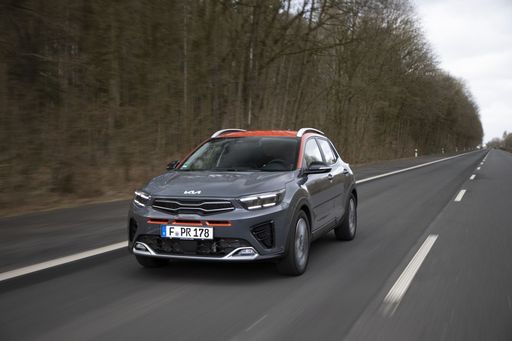 @ press.kia.com
@ press.kia.com
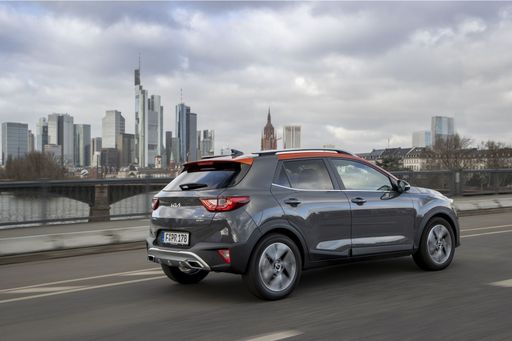 @ press.kia.com
@ press.kia.com
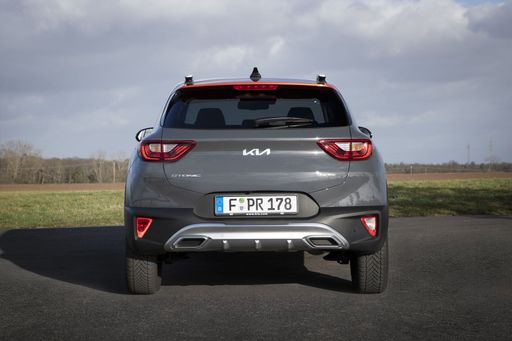 @ press.kia.com
@ press.kia.com
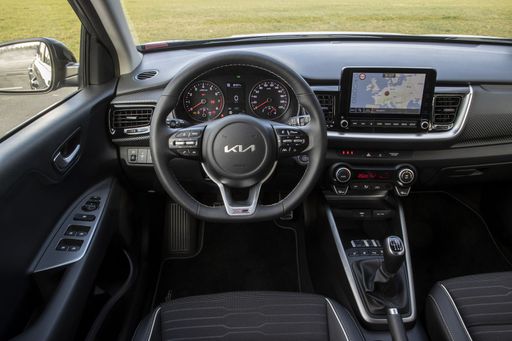 @ press.kia.com
@ press.kia.com
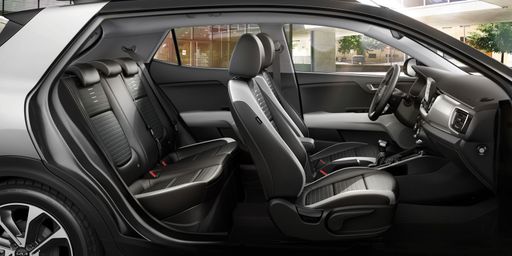 @ press.kia.com
@ press.kia.com
 @ hyundai.news
@ hyundai.news
 @ hyundai.news
@ hyundai.news
 @ hyundai.news
@ hyundai.news
 @ hyundai.news
@ hyundai.news
 @ hyundai.news
@ hyundai.news

|

|
|
|
|
Kostnader og forbruk |
|
|---|---|
|
Pris
ca. 22500 - 29700
€
|
Pris
ca. 22900 - 29600
€
|
|
Forbruk L/100km
5.5 - 5.8
L
|
Forbruk L/100km
5.4
L
|
|
Forbruk kWh/100km
-
|
Forbruk kWh/100km
-
|
|
Elektrisk rekkevidde
-
|
Elektrisk rekkevidde
-
|
|
Batterikapasitet
-
|
Batterikapasitet
-
|
|
CO2
125 - 132
g/km
|
CO2
122
g/km
|
|
Tankkapasitet
45
L
|
Tankkapasitet
40
L
|
Dimensjoner og karosseri |
|
|
Karosseritype
SUV
|
Karosseritype
SUV
|
|
Seter
5
|
Seter
5
|
|
Dører
5
|
Dører
5
|
|
Egenvekt
1155 - 1260
kg
|
Egenvekt
1170 - 1195
kg
|
|
Bagasjerom
352
L
|
Bagasjerom
411
L
|
|
Lengde
4140
mm
|
Lengde
4180
mm
|
|
Bredde
1760
mm
|
Bredde
1775
mm
|
|
Høyde
1505
mm
|
Høyde
1500
mm
|
|
Nyttelast
445 - 455
kg
|
Nyttelast
460 - 465
kg
|
Motor og ytelse |
|
|
Motortype
Bensin, Mild hybrid bensin
|
Motortype
Bensin
|
|
Girkasse
Manuel, Automatisk
|
Girkasse
Manuel, Automatisk
|
|
Gir detalj
Manuell girkasse, Automat. Schaltgetriebe (Doppelkupplung)
|
Gir detalj
Manuell girkasse, Automat. Schaltgetriebe (Doppelkupplung)
|
|
Drivtype
Forhjulsdrift
|
Drivtype
Forhjulsdrift
|
|
Effekt HK
79 - 100
HK
|
Effekt HK
100
HK
|
|
Akselerasjon 0-100km/t
11.3 - 14.2
s
|
Akselerasjon 0-100km/t
11.3 - 12.4
s
|
|
Maksimal hastighet
158 - 179
km/h
|
Maksimal hastighet
176 - 179
km/h
|
|
Dreiemoment
113 - 200
Nm
|
Dreiemoment
172 - 200
Nm
|
|
Antall sylindere
3 - 4
|
Antall sylindere
3
|
|
Effekt kW
58 - 74
kW
|
Effekt kW
74
kW
|
|
Motorvolum
998 - 1197
cm3
|
Motorvolum
998
cm3
|
|
Topphastighet
158 - 179
km/h
|
Topphastighet
176 - 179
km/h
|
Generelt |
|
|
Modellår
2024
|
Modellår
2024
|
|
CO2-effektivitetsklasse
D
|
CO2-effektivitetsklasse
D
|
|
Merke
Kia
|
Merke
Hyundai
|
Kia Stonic
A Versatile Compact SUV: Introducing the Kia Stonic
The Kia Stonic stands out in the ever-crowded market of compact SUVs, offering a blend of practicality and style underpinned by advanced technology. With its robust build and dynamic aesthetics, the Stonic is designed to appeal to those seeking versatility without compromising on performance and comfort. Let's delve into the technical details and innovations that make the Kia Stonic a compelling choice.
Powertrain Options: From Traditional to Mild-Hybrid
The Kia Stonic features a range of engine choices to cater to diverse consumer needs. The traditional petrol engines are available alongside modern mild-hybrid variants, offering both manual and automatic transmission choices. This flexibility is further bolstered by its front-wheel drive system, delivering a smooth and controlled driving experience. The power output ranges from 79 to 100 PS, with fuel efficiency figures varying between 5.5 to 5.8 litres per 100 km, making it a cost-effective option for urban and suburban driving.
Performance Specs: Balancing Power and Efficiency
The Stonic's performance is defined by its agile handling and responsive power delivery. Its acceleration can take you from 0 to 100 km/h in approximately 11.3 to 14.2 seconds, with a top speed ranging between 158 and 179 km/h. The vehicle's torque is rated between 113 to 200 Nm, delivered effectively across its 3 to 4 cylinder configurations. The Stonic shines with its balance of performance and efficiency, appealing to eco-conscious drivers with its CO2 emissions rated between 125 to 132 g/km.
Innovative Design: Exterior and Interior
Measuring 4140 mm in length, 1760 mm in width, and 1505 mm in height, the Stonic provides a compact yet spacious interior. The model accommodates five passengers comfortably, with ample cargo space of 352 litres, ensuring practicality for everyday use. The exterior design reflects Kia's commitment to a sporty and sleek aesthetic, while the interior is equipped with user-friendly technology aimed at enhancing driver convenience and comfort.
Price and Value: An Attractive Offering
The Kia Stonic is priced between €22,490 and €29,680, depending on the chosen model and specifications. This positions it competitively within the compact SUV segment, offering high value through its quality build and suite of standard features. Monthly costs are manageable, ranging from €826 to €915, with a cost per kilometre between 33 to 36.6 cents, making the Stonic an economical choice for sustained ownership.
Conclusion: A Smart Choice for the Modern Driver
With its range of engine options, innovative design, and practical performance specifications, the Kia Stonic is well-suited for the modern driver seeking an efficient, stylish, and versatile vehicle. Its competitive pricing and exemplary fuel economy further contribute to its appeal, marking it as a standout choice in the compact SUV market.
Hyundai Bayon
Introducing the Hyundai Bayon: A New Era in Compact SUVs
The Hyundai Bayon, a compact SUV designed with urban adventurers in mind, is making waves with its exceptional blend of style, performance, and technology. The brand has pulled out all the stops to ensure that the Bayon stands out in the crowded SUV market, offering a vehicle that is both practical and innovative.
Sleek Design and Cutting-Edge Aerodynamics
The Bayon features a striking exterior design, characterised by its bold lines and angular shapes. With a length of 4180 mm, a width of 1775 mm, and a height of 1500 mm, the Bayon commands attention with its modern appeal and aerodynamic efficiency. These dimensions not only contribute to its sleek design but also enhance fuel efficiency, achieving an impressive 5.4 L/100 km.
Engine Performance and Specifications
Under the bonnet, the Bayon is powered by a 1.0-litre T-GDI petrol engine, delivering a robust 100 PS or 74 kW. This engine is available with either a manual or automatic gearbox, meeting varied driver preferences. The front-wheel-drive system complements its urban-centric design, ensuring a smooth and responsive ride.
Maximised Interior Space and Comfort
The spacious interior of the Bayon accommodates up to five passengers comfortably. The vehicle boasts a boot space of 411 litres, perfect for both everyday use and weekend getaways. The cabin is designed with practicality and technology in mind, with intuitive controls and ample storage options.
Advanced Technology and Connectivity
Hyundai has equipped the Bayon with state-of-the-art technology to enhance the driving experience. The SUV features a high-resolution touchscreen, offering seamless connectivity with Apple CarPlay and Android Auto. Safety is also a priority, with multiple driver assistance systems including lane-keeping assist and forward collision avoidance assist.
Environmental Efficiency
Despite its powerful performance, the Bayon achieves a respectable CO2 efficiency class of D, with emissions as low as 122 g/km. This balance between performance and environmental responsibility makes the Bayon an attractive option for conscientious drivers.
Affordability and Market Appeal
The Hyundai Bayon is competitively priced, ranging from €22,900 to €29,600. Its affordable running costs, estimated at 32.3 to 36.4 cents per kilometre, further enhance its appeal to budget-conscious consumers. With monthly costs ranging from €806 to €909, the Bayon provides excellent value without compromising on features or performance.
Final Thoughts
The Hyundai Bayon truly stands out in the compact SUV segment, combining style, innovation, and practicality in an appealing package. It offers a versatile driving experience suited to the demands of modern urban living, making it a top contender in its class. As Hyundai continues to champion forward-thinking design and technology, the Bayon is a testament to the company's ongoing commitment to excellence.
